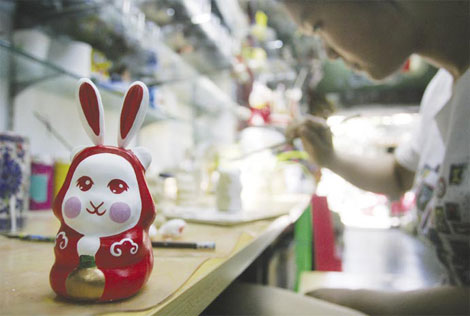Life and Leisure
Beijing's rabbit dons a modern suit
By Liu Lu (China Daily)
Updated: 2010-09-17 10:51
 |
Large Medium Small |
|
Doudou puts her finishing touches on a Rabbit God figurine (Tu'er Ye in Chinese) in a souvenir shop selling traditional Chinese handicrafts in Beijing. Cui Meng / China Daily |
BEIJING - Inside a workshop, a quiet teenager sits on a bench, carefully brushing colorful pigments onto a dull and grayish piece of clay in the shape of a rabbit. Outside the shop, curious passers-by stop to watch her every movement.
The girl, who identified herself as Doudou, is putting the finishing touches on a Rabbit God figurine (Tu'er Ye in Chinese) in a souvenir shop selling traditional Chinese handicrafts in Guozijian, a Beijing tour site that looks untouched by modern technology. Doudou said she will give the handmade gift to her grandparents for the forthcoming Mid-Autumn Festival, one of the most important traditional festivals in China and which falls on Sept 22 this year. She hopes the gift will bring her family good luck.
The Rabbit God has been a symbol of peace and fortune in Beijing folklore. Many clay figures of the icon, usually depicted in a strong, powerful pose, can be seen throughout the city, especially as the festival nears. Supposedly modeled after the jade rabbit, which according to legends descended from the moon long ago to save a plague-stricken Beijing, the Rabbit God is commemorated every year on the Mid-Autumn Festival, the 15th day of the eighth lunar month, when the moon is believed to be at its roundest and brightest.
But the role of the clay rabbit figurine is evolving. It's now seen less as a shrine for people to celebrate and more as a cute gift for children and elders alike. For Beijing locals older than 50, the gift of a Rabbit God is a great pleasure today, evoking their childhood memories when they first learned about the legend.
Lin Bo, the owner of the souvenir shop in Guozijian, said the interest in Doudou's craftwork reflects a growing trend - more people want to design their own Rabbit Gods as gifts for the holidays. With the festive season approaching, he is seeing more and more customers come to his shop, especially youths who want to surprise their relatives or friends by giving them the uniquely dressed Rabbit God that they themselves designed.
"People choose the Rabbit God as Mid-Autumn Festival gifts because they are more willing to express good wishes through traditional manners," said Lin. "The changing concepts made Rabbit God a more popular holiday gift exchanged between people ahead of the Mid-Autumn Day."
Lin encourages people to tap into their creative side by visualizing their imagination on a piece of unpainted clay. A customer only needs to pay 10 yuan ($1.47) to design a Rabbit God.
The cartoon-like Rabbit God figurine, neatly placed on the shelf in Lin's shop, has been very popular recently because of their different, stylish appearance. Lin said the style has been selling well. The cartoon-like figurines are vastly different from the traditional styles, which all feature white faces, warrior's helmets and armor with flags or canopies on the back. Most of the traditional Rabbit God figures have a variety of transports, like a tiger, elephant or lotus. The modern figurines wear suits, play basketball and drive a luxury sedan.
"They conform to today's aesthetic standards," Lin said. "Just like Tu'er Ye, the designs of many other traditional art crafts have been updated with modern elements, too."
Liao Po-hao, a 21-year-old senior student at Tainan National University of the Arts, said he came to Beijing alone all the way from Taiwan during the summer vacation in the hopes of getting a closer look at the Rabbit Gods. After spending two days in Beijing, he will be heading home with several handmade traditional Rabbit Gods from the Sheng Tang Xuan shop in Guozijian.
"I was fascinated with Tu'er Ye since I first learned about it from a Beijing tourism book," Liao said. "But I still felt amazed when I saw them at the first sight, since they are more beautiful than in pictures."
Sheng Tang Xuan is a popular shop in Guozijian that specializes in selling handmade traditional Chinese handicraft. Shop owner Tang Yujie said the Rabbit Gods sold in her shop are priced from 30 yuan, which are made by apprentices, to 10,000 yuan, which are made by veteran craftsmen.
Tang said her shop's sales volume of Tu'er Ye has grown each year. She said the number of companies that buy large numbers of Rabbit Gods from her has also been growing and has helped her expand the shop.
Internet sellers said they have also seen a boost in sales of Rabbit Gods. Compared to brick and mortar stores, online retailers offer cheaper prices that are more appealing to buyers.
"The sales volume of Tu'er Ye in my virtual shop has jumped from less than 1,000 in 2006, the year when I started the online business, to 10,000 currently," said 29-year-old Hu Song, who runs his shop on Taobao.com, China's largest online marketplace.
"The tradition of worshipping the Rabbit God has deeper meaning than eating moon-cakes, so why not pick up the old tradition?"
Back at the souvenir shop, Doudou finishes her masterpiece after almost three hours. In her hands, there is no longer dull clay, but a pretty rabbit goddess with round eyes and leaf-like eyebrows.
"I am sure it will be a great surprise and a meaningful gift to my grandparents," said the proud girl.
China Daily
